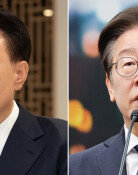New COVID-19 cases go over 20,000 a day in 45 days
New COVID-19 cases go over 20,000 a day in 45 days
Posted July. 11, 2022 08:23,
Updated July. 11, 2022 10:34
Amidst the shock of former Japanese Prime Minister Shinzo Abe’s assassination, the election for the House of Councilors was held on Sunday in Japan. Japanese media predicted that the ruling Liberal Democratic Party will win by a landslide based on exit polls. While the party’s win had been expected, the former prime minister’s assassination just two days before the election encouraged more votes from the conservatives.
The former prime minister’s death, along with the changes in the House of Councilors, is likely to accelerate the rightwing trend in Japanese politics. Constitutional reform, which has been wanted by the conservatives for a long time, will gain momentum. The number of seats taken by the Liberal Democratic Party and the opposite parties in favor of constitutional reform is predicted to exceed two-thirds of the total seats, which is required for the reform. In the House of Representatives, the Liberal Democratic Party and those in favor of constitutional reform already have enough seats.
Former Prime Minister Abe was a symbolic figure of the hard right who had pursued to strengthen the country’s military power with constitutional reform during his time in office for eight years and eight months. Commemoration for him is likely to create public sentiment favorable to constitutional reform. If the country’s constitution is amended, Japan will become closer to a country that can start a war. Former Prime Minister Abe’s major pledges were to increase the country’s defense expenses to over 100 trillion won, which is about two percent of its GDP, and to officially allow Japan to attack enemies’ bases, which is in violation of an exclusively defensive security policy. Japan’s military power strengthening is also likely to further accelerate, given the current new Cold War structure.
Such changes in Japan’s external policies will have a significant impact on relations between South Korea and Japan. While Japan’s military power increase will strengthen deterrence against North Korea, it can raise concerns in neighboring countries as the war criminal country becomes rearmed. In addition, Japan has been consistently denying its history of imperialistic invasion and claiming Dokdo as its territory. If hardliners in Japan gain more power, discussions to improve relations between South Korea and Japan, which just began recently, may be suspended and tensions between the two countries may worsen.
Of course, some expect that the drive to implement extreme policies in Japan will slow down as the far-right has lost the former prime minister. However, given the charged atmosphere of Japanese society, the strong rightwing trend is likely to continue for a while. In order to address more complex issues of bilateral relations, South Korea needs to reexamine its strategy for historical and security issues in consideration of the current situation. The South Korean government needs to control the speed of discussions regarding forced labor and comfort women issues and adopt a calmer and more cool-headed approach. In addition, concerns in the security sector need to be resolved from multiple angles from the perspective of trilateral cooperation among South Korea, the U.S., and Japan.
The former prime minister’s death, along with the changes in the House of Councilors, is likely to accelerate the rightwing trend in Japanese politics. Constitutional reform, which has been wanted by the conservatives for a long time, will gain momentum. The number of seats taken by the Liberal Democratic Party and the opposite parties in favor of constitutional reform is predicted to exceed two-thirds of the total seats, which is required for the reform. In the House of Representatives, the Liberal Democratic Party and those in favor of constitutional reform already have enough seats.
Former Prime Minister Abe was a symbolic figure of the hard right who had pursued to strengthen the country’s military power with constitutional reform during his time in office for eight years and eight months. Commemoration for him is likely to create public sentiment favorable to constitutional reform. If the country’s constitution is amended, Japan will become closer to a country that can start a war. Former Prime Minister Abe’s major pledges were to increase the country’s defense expenses to over 100 trillion won, which is about two percent of its GDP, and to officially allow Japan to attack enemies’ bases, which is in violation of an exclusively defensive security policy. Japan’s military power strengthening is also likely to further accelerate, given the current new Cold War structure.
Such changes in Japan’s external policies will have a significant impact on relations between South Korea and Japan. While Japan’s military power increase will strengthen deterrence against North Korea, it can raise concerns in neighboring countries as the war criminal country becomes rearmed. In addition, Japan has been consistently denying its history of imperialistic invasion and claiming Dokdo as its territory. If hardliners in Japan gain more power, discussions to improve relations between South Korea and Japan, which just began recently, may be suspended and tensions between the two countries may worsen.
Of course, some expect that the drive to implement extreme policies in Japan will slow down as the far-right has lost the former prime minister. However, given the charged atmosphere of Japanese society, the strong rightwing trend is likely to continue for a while. In order to address more complex issues of bilateral relations, South Korea needs to reexamine its strategy for historical and security issues in consideration of the current situation. The South Korean government needs to control the speed of discussions regarding forced labor and comfort women issues and adopt a calmer and more cool-headed approach. In addition, concerns in the security sector need to be resolved from multiple angles from the perspective of trilateral cooperation among South Korea, the U.S., and Japan.
Headline News
- Internal rebellion investigation transferred to Public Prosecutor's Office
- Gov’t to approve Yongin Semiconductor National Industrial Complex
- US conservatives rally around Trump’s third term
- Lee Hyo-song named youngest Rookie of the Year in JLPGA history
- Controversy escalates over the appointment of Constitutional Court justices







